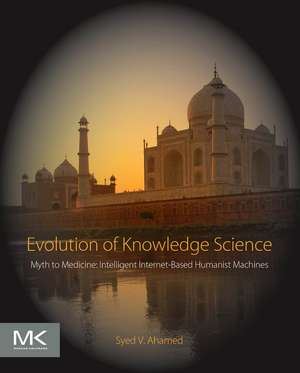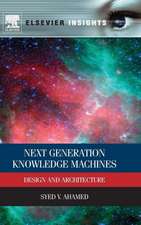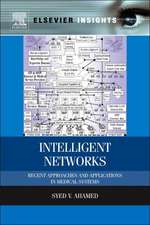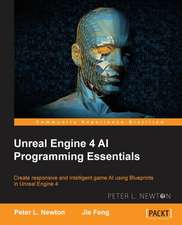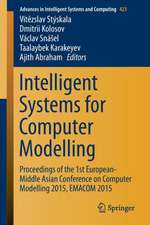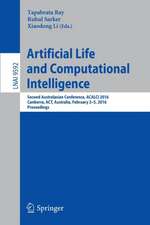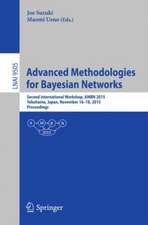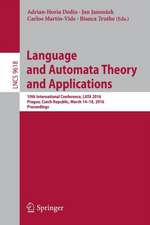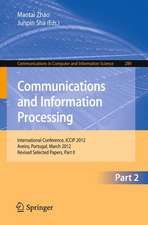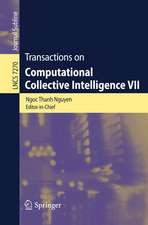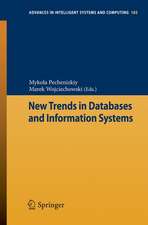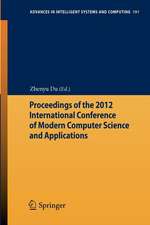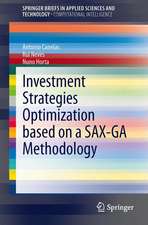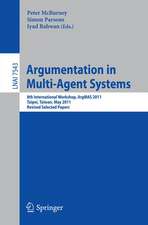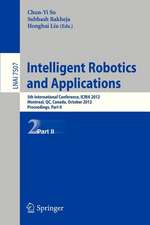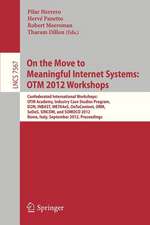Evolution of Knowledge Science: Myth to Medicine: Intelligent Internet-Based Humanist Machines
Autor Syed V. Ahameden Limba Engleză Paperback – 11 noi 2016
Author Syed Ahamed joins the basic concepts from various disciplines to describe a robust and coherent knowledge sciences discipline that provides readers with tools, units, and measures to evaluate the flow of knowledge during course work or their research. He offers a unique academic and industrial perspective of the concurrent dynamic changes in computer and communication industries based upon his research. The author has experience both in industry and in teaching graduate level telecommunications and network architecture courses, particularly those dealing with applications of networks in education.
- Presents a current perspective of developments in central, display, signal, and graphics processor-units as they apply to designing knowledge systems
- Offers ideas and methodologies for systematically extending data and object processing in computing into other disciplines such as economics, mathematics, and management
- Provides best practices and designs for engineers alongside case studies that illustrate practical implementation ideas across multiple domains
Preț: 352.21 lei
Preț vechi: 440.27 lei
-20% Nou
Puncte Express: 528
Preț estimativ în valută:
67.39€ • 70.55$ • 55.77£
67.39€ • 70.55$ • 55.77£
Carte tipărită la comandă
Livrare economică 29 martie-12 aprilie
Preluare comenzi: 021 569.72.76
Specificații
ISBN-13: 9780128054789
ISBN-10: 0128054786
Pagini: 578
Dimensiuni: 191 x 235 x 38 mm
Greutate: 0.98 kg
Editura: ELSEVIER SCIENCE
ISBN-10: 0128054786
Pagini: 578
Dimensiuni: 191 x 235 x 38 mm
Greutate: 0.98 kg
Editura: ELSEVIER SCIENCE
Cuprins
Part I: Knowledge, Wisdom and Values
Section I: From Early Thinker to Social Scientists
Chapter 1. Knowledge and Wisdom Across Cultures
Chapter 2. From Philosophers to Knowledge Machines
Chapter 3. Affirmative Knowledge and Positive Human Nature
Chapter 4. Negative Knowledge and Aggressive Human Nature
Chapter 5. Role of Devices, Computers and Networks
Section II: Information Machines and Social Progress
Chapter 6. Recent Changes to the Structure of Knowledge
Chapter 7. Origin and Structure of Knowledge Energy
Chapter 8. Bands of Knowledge
Chapter 9. Frustums of Artificial Behavior
Chapter 10. Computer-Aided Knowledge Design and Validation
Section III: Knowledge Science and Social Influence
Chapter 11. Knowledge and Information Ethics
Chapter 12. From Primal Thinking to Potential Computing
Chapter 13. Action (VF) → (*) ← Object (NO) Based Processors and Machines
Chapter 14. Aphorism and Truism in Knowledge Domain
Chapter 15. Timing Sequences and Influence of Time
Part II: Summary
Section I. The Scientific basis for Knowledge Flow
Chapter 16. General Flow Theory of Knowledge
Chapter 17. Transmission Flow Theory of Knowledge
Chapter 18. Quantum Flow Theory of Knowledge
Chapter 19. Inspiration Flow Theory of Knowledge
Chapter 20. Dynamic Nature of Knowledge: Fragmentation and Flow
Section II: Preface
Chapter 21. Knowledge Potential and Utility
Chapter 22. Elements of Knowledge as Elements in Nature
Chapter 23. Knowledge Element Machine Design: Pathways of Knowledge in Machines
Chapter 24. Elements of Knowledge in Societies
Chapter 25. Role of Human Discretion in Society and Its Impact on Ecosystems
Section III: Preface
Chapter 26. Scientific Foundations of Knowledge
Chapter 27. Real Space, Knowledge Space and Computational Space
Chapter 28. General Structure of Knowledge (no*→ vf and vf*→ no)
Chapter 29. The Architecture of a Mind-Machine
Chapter 30. The Architecture of a Medical Machine
Section I: From Early Thinker to Social Scientists
Chapter 1. Knowledge and Wisdom Across Cultures
Chapter 2. From Philosophers to Knowledge Machines
Chapter 3. Affirmative Knowledge and Positive Human Nature
Chapter 4. Negative Knowledge and Aggressive Human Nature
Chapter 5. Role of Devices, Computers and Networks
Section II: Information Machines and Social Progress
Chapter 6. Recent Changes to the Structure of Knowledge
Chapter 7. Origin and Structure of Knowledge Energy
Chapter 8. Bands of Knowledge
Chapter 9. Frustums of Artificial Behavior
Chapter 10. Computer-Aided Knowledge Design and Validation
Section III: Knowledge Science and Social Influence
Chapter 11. Knowledge and Information Ethics
Chapter 12. From Primal Thinking to Potential Computing
Chapter 13. Action (VF) → (*) ← Object (NO) Based Processors and Machines
Chapter 14. Aphorism and Truism in Knowledge Domain
Chapter 15. Timing Sequences and Influence of Time
Part II: Summary
Section I. The Scientific basis for Knowledge Flow
Chapter 16. General Flow Theory of Knowledge
Chapter 17. Transmission Flow Theory of Knowledge
Chapter 18. Quantum Flow Theory of Knowledge
Chapter 19. Inspiration Flow Theory of Knowledge
Chapter 20. Dynamic Nature of Knowledge: Fragmentation and Flow
Section II: Preface
Chapter 21. Knowledge Potential and Utility
Chapter 22. Elements of Knowledge as Elements in Nature
Chapter 23. Knowledge Element Machine Design: Pathways of Knowledge in Machines
Chapter 24. Elements of Knowledge in Societies
Chapter 25. Role of Human Discretion in Society and Its Impact on Ecosystems
Section III: Preface
Chapter 26. Scientific Foundations of Knowledge
Chapter 27. Real Space, Knowledge Space and Computational Space
Chapter 28. General Structure of Knowledge (no*→ vf and vf*→ no)
Chapter 29. The Architecture of a Mind-Machine
Chapter 30. The Architecture of a Medical Machine
Recenzii
"Information Science is on the cusp of defining the transition from Big Data to Knowledge. This movement is being fueled by an urgency in addressing grand challenges in fields as diverse as health, public safety and climate change. Domain experts in these fields are looking to information science to provide a quantitative basis for solving hard problems in their data-intensive fields....Prof. Ahamed’s book represents a rigorous and optimistic declaration of this revolutionary trend. I recommend it heartily to teachers and students in communications and computing, and to those in pursuit of incisive mathematical philosophy." --From the Foreword by Professor Dr. Nikil Jayant, Eminent Scholar (Emeritus), Georgia Research Alliance
